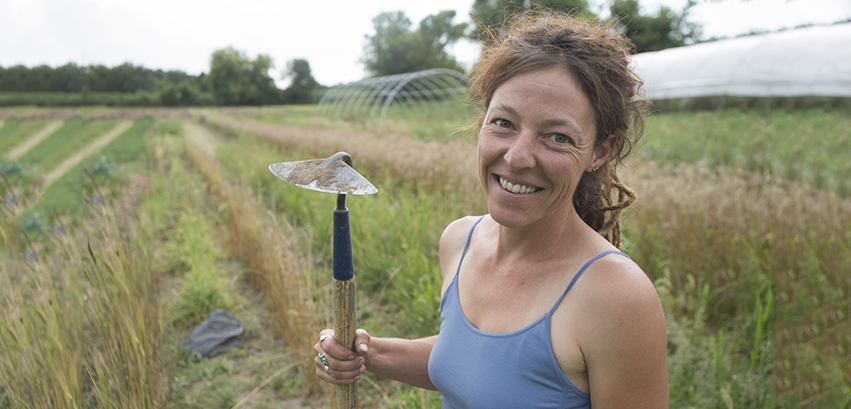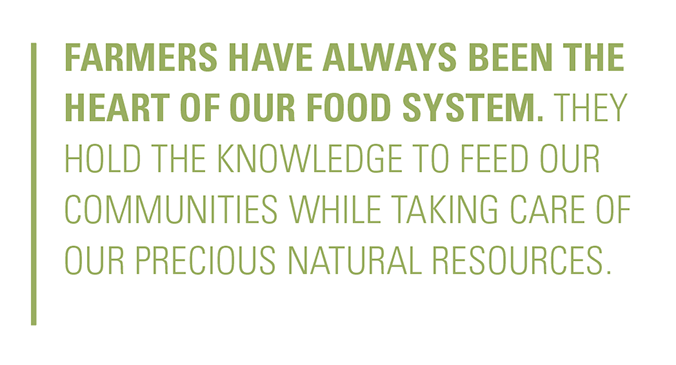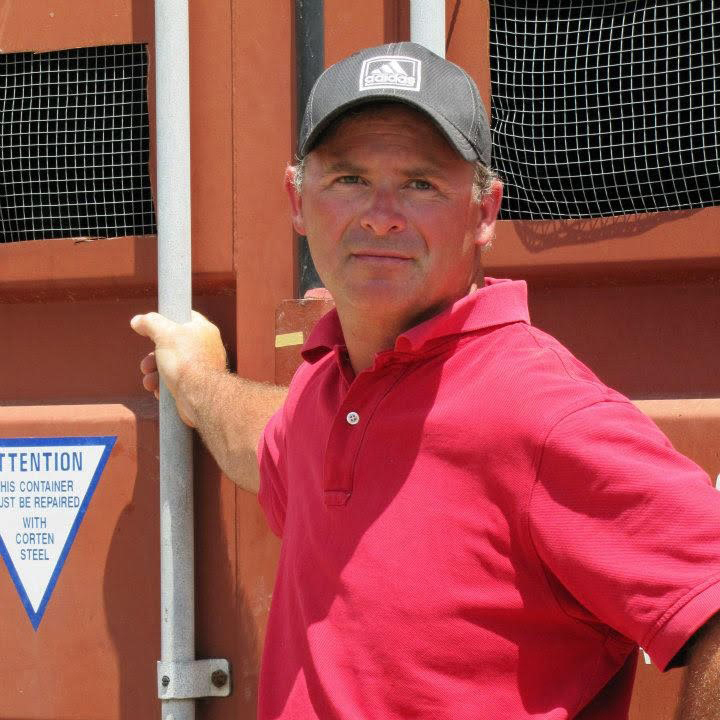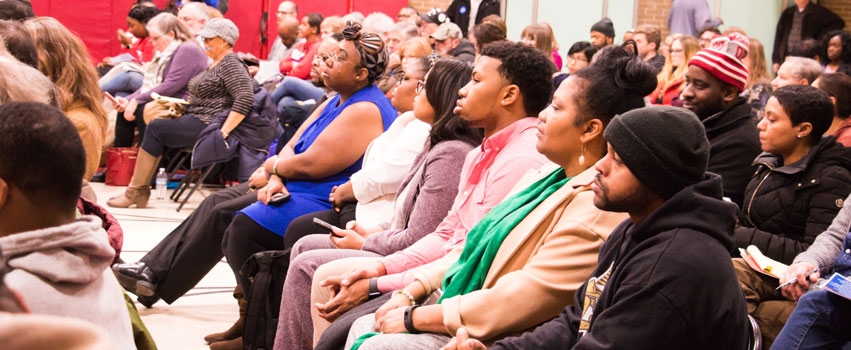Farmers Unite for Local Foods

In the midst of a global pandemic, market volatility and widespread uncertainty, Illinois food farmers are leaning into what they know best: the power of working together.
Over the past year, farmers have banded together to form Illinois Stewardship Alliance’s new Local Food Farmers Caucus (LFFC), a network of producers from across the state who believe Illinois farmers can feed Illinois—and are working to make that happen. They meet regularly to discuss issues and challenges, solve problems, and put forward state policy initiatives that will help grow the local food economy in Illinois.
The LFFC launched in December of 2020 with a two-day virtual kickoff event led by a team of 11 farmers. The event attracted more than 60 fruit, vegetable and livestock farmers from every corner of the state. They discussed what it means to be a member of the Caucus, brainstormed how they will collectively identify issues, and envisioned what could get accomplished when they come together as a unified group.
The December kickoff sparked tangible momentum for the group, and the Caucus has grown to over 70 farmer members since January. The Caucus unanimously passed a legislative agenda and has broken into a number of issue committee groups that are driving forward specific legislative goals.
Why It Matters
The Caucus could not have come at a better time. Over the past decade, the demand for local food has waxed and waned in a number of ways. The number of farmers’ markets in the U.S. grew by 180 percent between 2006 and 2014. However, local producers across the Midwest reported a drop in direct sales, primarily through CSA memberships and farmers markets since 2017.

The spring of 2020 brought local food farmers back into the spotlight. The COVID-19 pandemic disrupted the conventional food system, as grocery store shelves were swept clean, large meatpacking facilities shut down due to virus outbreaks, and milk was dumped when large-scale farmers lost accounts with institutions such as schools and universities. As consumers chose to turn to more trusted sources to get their foods, local producers were there—as they always have been—ready to provide healthy food to their communities when they needed it most.
“When the store shelves in Champaign emptied out, people panicked and Googled ‘eggs and milk near me’ and found us,” Penny Gioja of Joy of Illinois Farm shared during an LFFC meeting. “Our sales trended up.”
The Caucus helps provide a time and place for local farmers to discuss these varying trends and strategize the best ways to remove barriers while growing their businesses and making healthy, fresh food more accessible, in times of need, and into the future.
“If the pandemic has taught us one thing, it’s that food security is a high priority,” says Shaun Tyson of Tyson Farms in Mt. Pulaski. “One thing we can do to provide that basic human need of security is regional food distribution through community action that supports local businesses and farms.”
Farmers have always been the heart of our food system. They hold the knowledge to feed our communities while taking care of our precious natural resources. With the Caucus in place, farmers have the power to use their voice to shape policy that impacts them. Working together as a unified group earns more respect and recognition from lawmakers, which gives them a seat at the table where decisions are made.
Andy Hazzard, owner of Hazzard Free Farm in Pecatonica, believes farmers can make a difference if they can find a way to connect around their shared interests. “Other groups that support local farmers always felt distant to me, but the Caucus is literally in my backyard,” she explains. “The Caucus is my neighbor down the road who I do business with, and all the other farmers in Illinois who share the same challenges. We are all in this together.”

“The Local Food Farmers Caucus is working to build resiliency, market parity and equity in our food system,” adds Jody Osmund of Cedar Valley Sustainable Farm in Ottawa. “This includes strengthening and building our local processing options that are vital to our ongoing success. Market parity will help make it feasible for new farmers to enter the profession. Equity will help ensure diversity in the local food community, which will strengthen the broader community of eaters.”
Farmer Leadership, Community Support
Centering farmer leadership and decision-making has been a top priority of the Caucus since its inception. All meetings are led by farmers, and it is the farmers in the Caucus who developed the framework for identifying and prioritizing issues. With that framework in place, they quickly worked out a policy agenda for 2021.
At the top of their list is expanding the Illinois Cottage Food Law, which allows small businesses to process and package select foods in their home kitchens to sell at farmers’ markets throughout the state. The expansion of this law would remove restrictive regulations around sales avenues for cottage food operations and open up new sales channels—including fairs and festivals, home sales, pickup and delivery, and online sales. The Caucus chose to prioritize this issue because the act supports small farms, home bakers and artisan food makers across the state while increasing access to unique Illinois products. And their work is already making an impact: the LFFC assisted with drafting the Home-to-Market Act (HB 2615) sponsored by Rep. Will Guzzardi earlier this year.
In addition to the Home-to-Market Act, the LFFC has chosen to prioritize a $500,000 appropriation for the Healthy Local Food Incentives Fund and a Good Food Purchasing Policy. The Healthy Local Food Incentives Fund would create a statewide fund to match SNAP sales at farmers’ markets, doubling the purchasing power of low-income shoppers to afford fresh food, and putting more federal SNAP dollars in the pockets of family farmers in Illinois instead of big box stores. An Illinois Good Food Purchasing Policy would potentially shift millions of dollars in state procurement toward more local, fair, healthy, humane, and sustainable farms and businesses in Illinois.
In order to move these issues, the LFFC is seeking broad support from their communities, who would also benefit from greater access to fresh, local food and stronger local economies. To that end, the Caucus will host Illinois Stewardship Alliance’s first-ever Virtual Food & Farm Week of Action, April 19-22, 2021, inviting farmers and eaters across the state to learn more about these issues and take action. To learn more about the LFFC policy agenda and how you can get involved, visit ilstewards.org. PM
Kathleen Mueller is northern policy organizer for the Illinois Stewardship Alliance.
